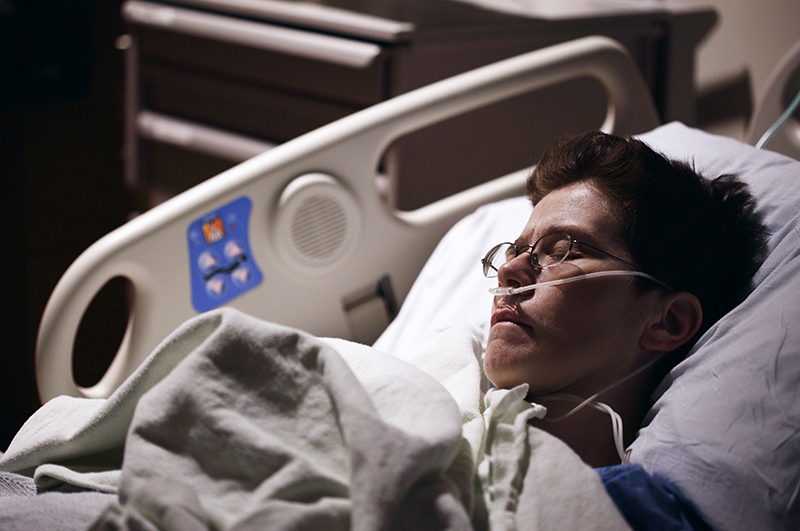MRINZ: Landmark ICU study shows early active exercise in adults receiving life support can be harmful
A groundbreaking clinical trial has shown that early initiation of active exercise in adults receiving life support in the Intensive Care Unit (ICU), does not improve patient outcomes and significantly increases the risk of adverse events.
The Trial of Early Active Mobilisation, TEAM study, published on 27 October 2022 in the prestigious New England Journal of Medicine (NEJM), showed that early active exercise of adults on life support in the ICU did not improve functional outcomes, quality of life, or survival. In fact, such exercise significantly increased complications including abnormal heart rhythms and low blood pressure compared to usual care.
Senior study author, MRINZ Deputy Director and Intensive Care Medicine Lead, Professor Paul Young, says, “The notion that exercising patients soon after starting life support might prevent development of muscle weakness was very appealing but previous clinical trials evaluating this strategy were small and inconclusive. We were surprised to find that this practice was not just ineffective but also potentially harmful.”
Professor Carol Hodgson, Deputy Director, Australian and New Zealand Intensive Care Research Centre, Department of Epidemiology and Preventive Medicine at Monash University, and lead TEAM investigator says, “We knew it was possible to exercise patients on life support, and, despite very little evidence, some clinicians have argued that this kind of exercise should be adopted as early as possible for ICU patients.”
“We considered that it was important to conduct a clinical trial before implementing early active exercise in New Zealand ICUs,” says Professor Young.
“Our study suggests that early exercise of patients on life support is ineffective and can cause adverse events. These findings are important because they will ultimately prevent patients receiving a treatment that does not benefit them and can cause harm.”
The TEAM Study
Approximately 13–20 million people receive treatment in ICUs worldwide annually. Here in Aotearoa New Zealand that number sits around 40,000.
Invasive mechanical ventilation, also known as ‘life support’, is a life-saving intervention undertaken in ICUs globally. Patients receiving life support are typically confined to bed with no active exercise. As technology and science evolve, more patients are surviving episodes of critical illness who once would have died. However, prolonged stays in ICUs are linked with severe weakness. Many people cannot even lift their arms off the bed when they leave the ICU because they have lost so much strength.
The weakness that develops in ICU patients can affect their ability to walk and perform simple activities like washing and using the toilet without help. This weakness can sometimes persist for many years or even last for the rest of a person’s life.
The TEAM trial compared the effect of early active exercise with usual care on recovery in 750 adults on life support in ICUs across Aotearoa New Zealand, Australia, USA, Germany, Brazil and Ireland. Active exercise is physiotherapy in which the patient is actively engaged in using their muscles and includes activities ranging from movement in bed to walking independently.
Patients were enrolled in the trial as soon as they were sufficiently stable to make mobilisation potentially possible.
The study showed that there was no significant difference in the number of days alive and out of hospital between those who received early active physiotherapy and those who received the usual care level of in-ICU mobilisation. Early active physiotherapy did not reduce the risk of functional impairment or impaired quality of life due to weakness at six months. Adverse events such as arrhythmia and low blood pressure were more common in the early active exercise group.
A Patient Perspective
76-year-old John Strawbridge developed severe weakness after four admissions to Wellington ICU between September 2020 and March 2021. John knows first-hand what it is like to suffer the consequences of ICU-acquired weakness, and his experience shows why research to reduce this condition is a public health priority.
John had a rocky initial three-week Wellington ICU stay with sepsis, a severe life-threatening infection complicating pancreatitis. After nine days on life support, John improved enough to be moved to a hospital ward for two days before returning to ICU for another week with a further critical episode of sepsis. This was a hugely challenging time for John and his whānau — progress was slow, setbacks were frequent, and his survival was delicate. John, a former athletics champion, was in hospital for close to five months. John’s ICU acquired weakness was so severe that it took him a day and a half to remove the photos of his family from the wall next to his ICU bed upon discharge.
“Through this time, it was important for me to remain future focused and hold firmly to the vision of seeing my three grandchildren grow up. This, and the expert care of the ICU medical team and my specialists, really helped me to keep going,” says John, from his home in Paraparaumu, where he is gaining strength and thriving.
John says, “My public health experience was incredibly positive. I’m so glad to know there is ongoing research focus into supporting best recovery for those of us who have endured ICU acquired weakness.”
Actively exercising critically ill patients early requires significant clinical expertise, time and resources and is therefore a costly health intervention. The TEAM study findings provide strong evidence that such mobilisation is not a sound investment of limited healthcare dollars.
Professor Young says, “The TEAM study, funded by the New Zealand Health Research Council, and endorsed by the Australian and New Zealand Intensive Care Society Clinical Trials Group, will change ICU physiotherapy practices and patient outcomes worldwide.”
More information
Early Active Mobilization during Mechanical Ventilation in the ICU, October 26, 2022 DOI: 10.1056/NEJMoa2209083
The TEAM Study Investigators and the ANZICS Clinical Trials Group
Members of the writing committee: Carol L. Hodgson, Ph.D., Michael Bailey, Ph.D., Rinaldo Bellomo, Ph.D., Kathy Brickell, R.G.N., Tessa Broadley, B.Biomed.Sci., Heidi Buhr, M.Sc.Med., Belinda J. Gabbe, Ph.D., Doug W. Gould, Ph.D., Meg Harrold, Ph.D., Alisa M. Higgins, Ph.D., Sally Hurford, P.G.Dip., Theodore J. Iwashyna, Ph.D., Ary Serpa Neto, Ph.D., Alistair D. Nichol, Ph.D., Jeffrey J. Presneill, Ph.D., Stefan J. Schaller, M.D., Janani Sivasuthan, M.P.H., Claire J. Tipping, Ph.D., Steven Webb, Ph.D., and Paul J. Young, M.B., Ch.B., Ph.D.
Find out more about the Medical Research Institute of New Zealand
Date posted: 27 October 2022

